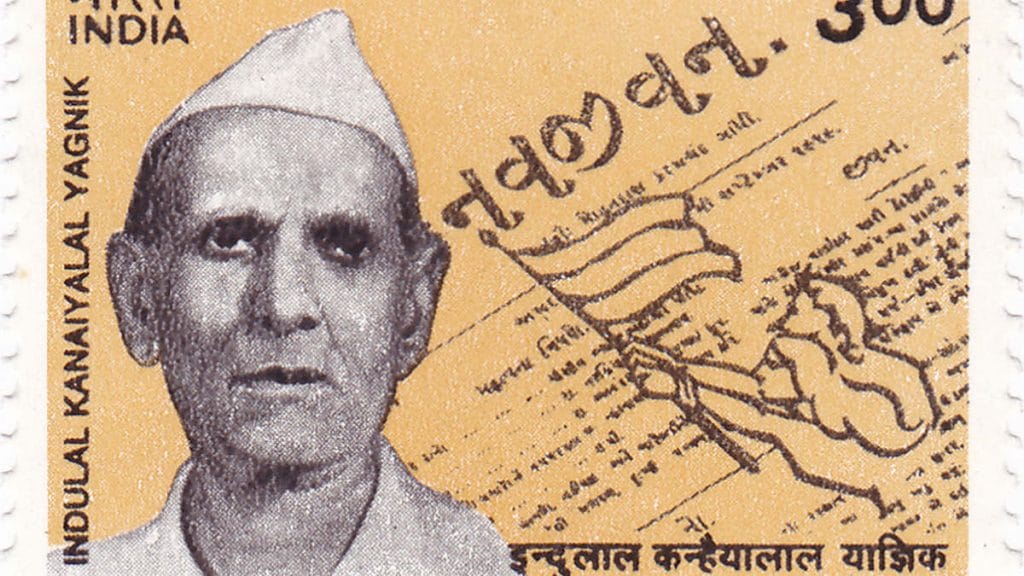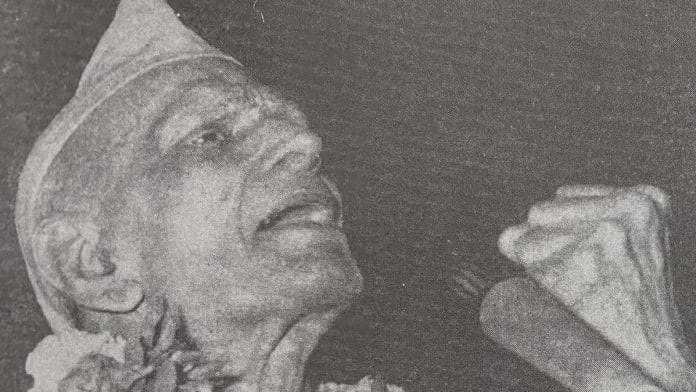Indulal Yajnik is mostly remembered as the force behind the Mahagujarat movement of the 1950s that pushed for the creation of Gujarat from the Bombay state. Called the “original faqir” by the people of Gujarat, his life was filled with dramatic twists and turns. His work was not limited to public service and mass movements, but spanned the realms of journalism, literature, films, and politics. Indulal was famous for his compassion — and also his impulsive nature.
Born in 1892 in Nadiad, a place revered as ‘Sakshar Bhoomi’ — the land of the erudite, particularly writers, poets, and philosophers— Indulal completed his BA and LLB in Bombay but chose the hardscrabble of literary pursuits over a lucrative career in law.
He embarked on his professional journey as a translator for the Gujarati daily Mumbai Samachar and also contributed to the esteemed Gujarati monthly Samalochak.
Indulal’s association with the affluent and radical nationalist Shankarlal Banker gradually transformed him into a sceptic and a nonconformist in terms of social customs. He also befriended ambitious young lawyers like KM Munshi and BG Kher, who went on to become the first prime minister of Bombay state.
By the time MK Gandhi returned to India from South Africa in 1915, Indulal and his companions were already immersed in public life.
Also Read: Vithalbhai was supposed to be the nation-builder & Vallabhbhai the family provider
Activism through journalism
Together with Banker, Munshi, and Ranjitram Mehta (the father of socialist Asoka Mehta), Indulal launched a Gujarati monthly in 1915, along the lines of the Calcutta-based Modern Review, the pre-eminent journal among nationalist intellectuals. They named it Navjivan (New Life), drawing inspiration from Dante’s La Vita Nuova. They merged it with a magazine called Satya, with Indulal as the editor. The publication incurred so much loss that it was renamed to Navjivan ane Satya.
Influenced by Annie Besant and the Home Rule League, which advocated for self-government for India within the British Empire, Indulal, along with his friends Banker and Jamnadas Dwarkadas, also established an English magazine, Young India, in 1915.
When the British government decided to dispatch a team of eight editors—four English and four Indian—to Mesopotamia (now Iraq) in 1917 to investigate allegations of mistreatment of Indian soldiers during World War I, Indulal was selected as one of them.
Meanwhile, as Gandhi embarked on his journey to understand India more intimately, Indulal became a member of the Servants of India Society, a secular association focused on welfare work, and even resided at its Bomby office.
Eventually, Indulal found himself at a crossroads, needing to choose between Gandhi’s call for satyagraha and the mild ways of the Servants of India Society. After much consideration, he opted for the latter in 1917.
Indulal and his friends then presented both Young India and Navjivan to Gandhi to serve as platforms for the nationalist movement. Indulal remained the publisher of Navjivan for more than two years.
Satyagraha advocate to vocal critic
Indulal was an active participant in Gandhi’s 1918 Kheda Satyagraha, a resistance movement against oppressive land taxes for farmers. He was also keen to establish Gujarat Vidyapith, an institution of higher learning, with Gandhi. During drought relief work in 1921, he resided at Vallabhbhai Patel’s home.
Despite his close ties with Gandhi and Vallabhbhai, however, Indulal’s mercurial nature often created differences between him and the two nationalist leaders as detailed in his autobiography Atmakatha.

However, both Gandhi and Patel appreciated his genuine concern for marginalised castes and tribals and welcomed him back each time.
Indulal started a monthly named Yugdharma and a publication initiative with the same name in Ahmedabad in 1922 to promote nationalist activities. He even had the opportunity to share a prison cell with Gandhi for advocating satyagraha in 1923.
However, his mind was perpetually in turmoil over various matters, including disagreements with Gandhi’s approach. In a fit of frustration, he completely withdrew from nationalist activities, relocated to Bombay in 1924, and assumed the role of editor for Hindustan, a paper published by a communist named Ranchhoddas Lotwala.
He harshly criticised the 1928 Bardoli satyagraha—another campaign against unjust land taxes for farmers— from a socialist-communist perspective in his paper. Around this period, he also began smoking and consuming beer, he outlined in Atmakatha.
Foray into films, stint abroad
When Edwin Arnold’s The Light of Asia was adapted into a film, Indulal agreed to take up an offer to translate the titles into Gujarati in 1926.
Subsequently, he established connections with various film studios and began writing about films for different magazines and newspapers. He wrote a few stories for silent films and even ventured into producing. One of his notable films was Pavagadh nu Patan (The Fall of Pavagadh) in 1928. For a brief period, Indulal was entirely disconnected from the realms of both the Congress and communism.
After suffering setbacks as a film producer, however, Indulal pivoted back to his roots in nationalist activities, but with a global flavour.
Financed by his friend and well-wisher Mansukhlal Master, he travelled to Britain and Germany to champion India’s freedom movement. In 1931, when Gandhi was attending the Second Round Table Conference in London, Indulal was also in the city. He wrote articles and was associated with Ireland’s freedom movement, mingling with revolutionaries in Dublin. He aimed to join forces against British imperialism, collaborating with the activist Nora Connolly O’Brien to publish weekly pamphlets.
Farmers’ leader
After a five-year stint abroad, Indulal returned to India in 1935 and assumed the role of a Socialist leader, heading the Gujarat chapter of the Kisan Sabha, dedicated to mobilising farmers and advocating for their interests. His activities, deemed disruptive to public order amid the churn of World War II, led to his imprisonment in 1940.
Upon release, he dedicated himself to establishing ashrams and schools in underdeveloped areas. Diverging from the communists due to factors such as their support for proposed Pakistan and their endorsement of World War II as a ‘People’s War’, he founded the Gujarat Khedut Sabha in 1943, aimed at addressing the issues of farmers.
He established an ashram in Nenpur, near Mahemdavad, on the banks of the Vatrak river. This place became his lifelong base, where he also celebrated India’s Independence by hoisting the flag. In 1947, he launched Gram Vikas, a weekly publication covering rural issues, from Ahmedabad.
Also Read: Narsinhbhai Patel, Gujarati radical with DIY book on bombs denied God, called marriage a fraud
Mahagujarat movement & political rise
A movement for the creation of a separate Gujarati state from the bilingual Bombay state gained momentum in 1956. When a young student’s life was claimed in police firing during the agitation, Indulal rushed to Ahmedabad. He took charge of the movement, marking a new phase in his life.
Indulal successfully orchestrated a massive public gathering in Ahmedabad, coinciding with Prime Minister Jawaharlal Nehru’s public meeting. His work for the Mahagujarat movement earned him the moniker ‘Indu Chacha’.
However, when the state of Gujarat was inaugurated in 1960, he was conspicuously absent from the stage.
By this juncture, Indulal had already diverged into anti-Congress politics.
In the throes of the Mahagujarat movement, he established a political party called Janta Parishad, which achieved significant electoral success. In the 1957 elections, the party won 30 seats in the Bombay assembly and five seats in the Lok Sabha.
Indulal emerged as a key figure in the formation of non-Congress politics in Gujarat, gaining immense popularity among the public. His political career saw four consecutive Lok Sabha terms, starting from 1957. Despite his political success, he maintained a simple lifestyle. In 1972, he died following a short illness. Indulal’s six-part autobiography, Atmakatha, continues to serve as a valuable resource for understanding the socio-cultural and political history of Gujarat and Bombay.
Urvish Kothari is a senior columnist and writer based in Ahmedabad. He tweets @urvish2020. Views are personal.
(Edited by Asavari Singh)






